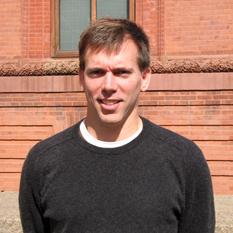Corey O’Hern Wins Ackerman Award for Teaching and Mentoring

One of things Corey O’Hern emphasizes to his students is that when they’re working on a problem, they’re doing it as a team.
 “It’s not like I have all of the answers,” said O’Hern, associate professor of mechanical engineering & materials science, physics, and applied physics. “I need the postdocs, graduate students, and undergraduate students to help solve the important, complex problems that my group considers. Instead of the students having to prove that they can work with me, I tell them that we’re in this program together, and their contributions are helpful.”
“It’s not like I have all of the answers,” said O’Hern, associate professor of mechanical engineering & materials science, physics, and applied physics. “I need the postdocs, graduate students, and undergraduate students to help solve the important, complex problems that my group considers. Instead of the students having to prove that they can work with me, I tell them that we’re in this program together, and their contributions are helpful.”
That approach is one of the many reasons O’Hern has been selected to receive the 2018 Ackerman Award for Teaching and Mentoring. Made possible by a generous gift from SEAS alum Robert W. Ackerman '60, this annual award, which includes a $5,000 cash prize, recognizes outstanding teaching and mentoring as evidenced by the faculty member's impact on, and involvement with, students.
In their nomination letters, O’Hern’s former students cited O’Hern’s ability to boost their confidence to work through challenging problems, and his help in striving for excellence (for example, many students recalled the amount of time he spent helping them rehearse and polish presentations). Several pointed to O’Hern’s conversational style of teaching and fostering an environment where everyone is free to ask questions.
“He strikes the perfect balance between giving his students the necessary liberty to pursue their own intellectual paths while keeping a close eye on their day to day work,” wrote one former graduate student. “My weekly meetings with him and other colleagues were always fulfilling, and I almost never left them with the sense that I had not learned anything.”
O’Hern said a direct, informal way of communicating is critical to how he teaches.
“When I’m talking with a student, I make sure they know the discussion is not a test,” he said. “I learn and teach by asking questions. I ask a question, the student gives an answer, and this repeats. In this way, the student and I make progress.”
O’Hern’s field of research is multidisciplinary, which means that his students can use what they’ve learned in many different subjects. Some continue their research in academia. But other skills - like the programming and statistical physics they picked up while studying in the O’Hern research group – allow his students to go in entirely different areas, like data science, finance, and consulting. In any case, O’Hern is glad to help them in their future careers.
Not everyone who earns a Ph.D. is going to go on to become a professor - there aren’t enough jobs for that to happen. One school of thought, then, is to minimize the number of Ph.D. candidates - O’Hern has a different view.
“I think there should be more Ph.D.s,” O’Hern said. “If we had more people trained with Ph.D.s, the U.S. would be more technically competent. Obtaining a Ph.D. is about becoming an independent scholar; you learn what questions to ask, and how you should go about answering them.”
Those are valuable skills however they’re applied.
“Part of the process of obtaining a Ph.D. is having students figure out what they want to do with their lives, and I’m happy to help that process in any way I can,” he said. “I want to help students to use their abilities to make the most impact.”

